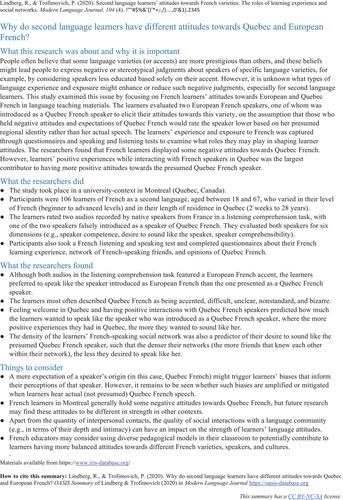当前位置:
X-MOL 学术
›
Mod. Lang. J.
›
论文详情
Our official English website, www.x-mol.net, welcomes your feedback! (Note: you will need to create a separate account there.)
Second Language Learners’ Attitudes Toward French Varieties: The Roles of Learning Experience and Social Networks
The Modern Language Journal ( IF 7.500 ) Pub Date : 2020-11-16 , DOI: 10.1111/modl.12674 RACHAEL LINDBERG 1 , PAVEL TROFIMOVICH 1
The Modern Language Journal ( IF 7.500 ) Pub Date : 2020-11-16 , DOI: 10.1111/modl.12674 RACHAEL LINDBERG 1 , PAVEL TROFIMOVICH 1
Affiliation

|
People often believe that certain language varieties are more prestigious than others (e.g., Kircher, 2014; Zhang & Hu, 2008), which can cause speech from perceived substandard varieties to trigger biases and inform social judgements of the speaker (Giles & Billings, 2004). These language-centered biases likely develop from classroom or cultural experience (Giles et al., 1974), but it is largely unknown what types of language experience and exposure might mitigate language biases, especially for second language (L2) learners engaged in classroom language learning. This study’s goal was to extend the limited knowledge on the effects of experience on L2 learners’ language-centered biases by focusing on L2 French learners’ attitudes towards different French varieties. Participants included 106 L2 French learners from various proficiency levels engaged in L2 French learning in Montreal, a city characterized by negative attitudes towards speakers of Quebec French. Participants rated two audios recorded by native speakers from France in a listening comprehension task, with one of the two speakers introduced as a speaker of Quebec French. They described their language learning experience, filled out a French social network questionnaire, and completed a French proficiency test. Results showed that participants engaged in reverse linguistic stereotyping, preferring to speak like one speaker significantly more than the other, based on the speaker’s assumed identity, not actual speech. Speech ratings were also largely associated with participants’ positive experiences in Quebec. Findings have implications for the use of speech models in L2 teaching and for the mitigation of language-centered biases in L2 classrooms.
中文翻译:

第二语言学习者对法语品种的态度:学习经验和社交网络的作用
人们通常认为某些语言变体比其他语言变体更有声望(例如,Kircher,2014 年;Zhang & Hu,2008 年),这会导致被认为不合标准的变体的言论引发偏见并影响说话者的社会判断(Giles & Billings,2004 年) )。这些以语言为中心的偏见可能源于课堂或文化体验(Giles 等,1974),但很大程度上未知哪些类型的语言体验和接触可能会减轻语言偏见,尤其是对于从事课堂语言的第二语言 (L2) 学习者学习。本研究的目标是通过关注二语法语学习者对不同法语变体的态度,扩展关于经验对二语学习者以语言为中心的偏见影响的有限知识。参与者包括 106 名来自不同水平的 L2 法语学习者,他们在蒙特利尔从事 L2 法语学习,该城市的特点是对讲魁北克法语的人持消极态度。参与者在听力理解任务中对来自法国的母语人士录制的两段音频进行评分,其中介绍的两位演讲者之一是魁北克法语的演讲者。他们描述了自己的语言学习经历,填写了法语社交网络问卷,并完成了法语水平测试。结果表明,参与者进行了反向语言刻板印象,根据说话者的假定身份,而不是实际讲话,他们更喜欢像一个说话者一样说话,而不是另一个说话者。言语评分在很大程度上也与参与者在魁北克的积极经历有关。
更新日期:2020-11-16
中文翻译:

第二语言学习者对法语品种的态度:学习经验和社交网络的作用
人们通常认为某些语言变体比其他语言变体更有声望(例如,Kircher,2014 年;Zhang & Hu,2008 年),这会导致被认为不合标准的变体的言论引发偏见并影响说话者的社会判断(Giles & Billings,2004 年) )。这些以语言为中心的偏见可能源于课堂或文化体验(Giles 等,1974),但很大程度上未知哪些类型的语言体验和接触可能会减轻语言偏见,尤其是对于从事课堂语言的第二语言 (L2) 学习者学习。本研究的目标是通过关注二语法语学习者对不同法语变体的态度,扩展关于经验对二语学习者以语言为中心的偏见影响的有限知识。参与者包括 106 名来自不同水平的 L2 法语学习者,他们在蒙特利尔从事 L2 法语学习,该城市的特点是对讲魁北克法语的人持消极态度。参与者在听力理解任务中对来自法国的母语人士录制的两段音频进行评分,其中介绍的两位演讲者之一是魁北克法语的演讲者。他们描述了自己的语言学习经历,填写了法语社交网络问卷,并完成了法语水平测试。结果表明,参与者进行了反向语言刻板印象,根据说话者的假定身份,而不是实际讲话,他们更喜欢像一个说话者一样说话,而不是另一个说话者。言语评分在很大程度上也与参与者在魁北克的积极经历有关。



























 京公网安备 11010802027423号
京公网安备 11010802027423号